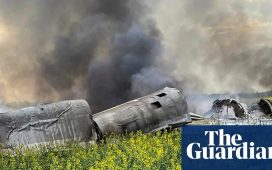Western forces on Friday agreed increases to their military support for Ukraine, but Germany wavered on further EU tank deliveries despite mounting calls from Kyiv and fellow allies.
“Today, we can all not yet say when a decision will be made about Leopard and what this decision will look like,” German Defense Minister Boris Pistorius said at the end of a meeting held at Germany’s Ramstein Air Base held with several defense leaders from across the world, including U.S. Defense Secretary Lloyd Austin.
He stressed that he intends for Berlin to be prepared if and when a decision is taken on Leopard 2 tanks. He added that he on Friday instructed an inspection of the German Leopard 2 inventories, both in military and in domestic industry stocks, ahead of a prospective decision.
“We are not really hesitating we are just very carefully balancing all the pros and contra [cons] — we are not talking just about delivering anything to anybody, this is a new kind of measure we would choose, so we have to be careful because we have a duty to look carefully and intensively at what might be the consequences for anybody in that conflict,” he said.
This is Pistorius’ second day in office, following the abrupt resignation of his predecessor Christine Lambrecht, who suffered intense domestic and international scrutiny over her ability to lead Berlin’s efforts in the war in Ukraine.
Ukraine has repeatedly asked for battle tanks from its Western allies, with Germany’s Leopard 2 units being of particular interest. Ukrainian President Volodymyr Zelenskyy has insisted that receiving supplies of Western tanks must outpace another Russian attack.
Officials in Berlin seem to fear that supplying the arms could escalate hostilities with Moscow, which has already accused the West of fighting a “proxy war” against Russia in Ukraine. In the hours before the meeting, the Kremlin said that Western tanks for Ukraine would “change nothing” and would not stop Russia from achieving its goals, Reuters reported.
Pistorius insisted that Germany is not alone in holding out on the tanks supply decision:
“I must say there is very clearly no unanimous opinion. The impression that has occasionally been made that there is a closed coalition and Germany stands in the way of this is wrong. There are many allies who say we share the opinion that I explained here today again, there are good reasons for the delivery and there are good reasons against it,” he said, as translated by CNBC.
Germany is now set to supply Ukraine with 50 anti-aircraft cheetah systems. Earlier this month, Berlin and Washington agreed a $3 billion aid package to Ukraine that will see Germany supply 40 Marder infantry fighting vehicles and a Patriot defense missile system to Kyiv. The U.S. will in turn contribute with 50 Bradley fighting vehicles.
“Mobilization of the world must outpace a next military mobilization of our joint enemy,” Zelenskyy said via videoconference at the World Economic Forum in Davos, Switzerland Wednesday.
Officials will now meet on a monthly basis, Austin said prior to the Ramstein meeting, stressing the importance for “nations of goodwill” to focus on “winning today’s fight and the struggles to come.” The U.S. on Friday also called for allies to “dig deeper” in response to the war in Ukraine.
Europe on standby
Poland, Finland and the Baltic states gave the green light to deliver their own Leopard 2 tanks to Ukraine. The Polish leadership expressed some frustration that Berlin had yet to follow suit.
“Consent is of secondary importance here, we will either obtain this consent quickly, or we will do what is needed ourselves,” Polish Prime Minister Mateusz Morawiecki told private broadcaster Polsat News Wednesday, as reported by Reuters.
“The most important thing is for Germany, but not only Germany … to offer their modern tanks, their modern heavy weapons, because Ukraine’s ability to defend its freedom may depend on that.”
The U.K. announced it would provide Ukraine with 14 Challenger 2 tanks Saturday, making the country the first to send such Western-made battle vehicles to Kyiv.
Dutch Prime Minister Mark Rutte told CNBC Thursday that the issue of whether or not to send tanks to Ukraine was “a sensitive decision.”
“I do agree there is an argument to send [tanks] to Ukraine. There is also an argument to take the decision in conjunction with others, including our friends in the U.S.,” Rutte said at the World Economic Forum in Davos.
He added that he was “fairly optimistic” that the situation “could get to a landing spot.”














